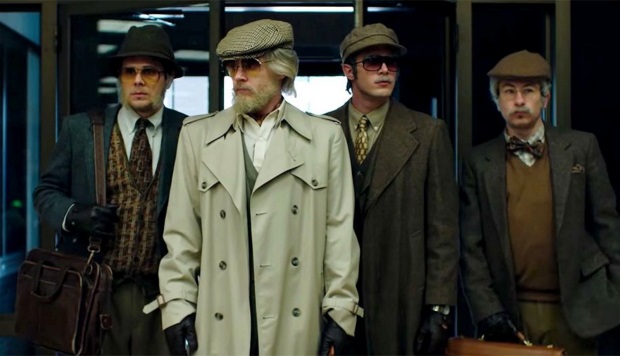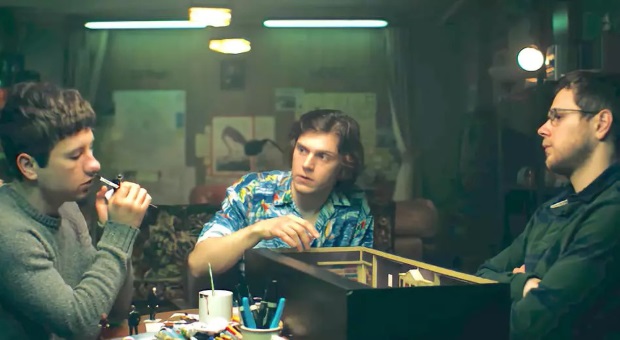American Animals: what happened next to the real people?
Director Bart Layton talks through the making of and the after effects of his amazing true life story
This article contains major spoilers for American Animals.
Bart Layton’s American Animals is out now in cinemas – a follow up to his groundbreaking documentary The Imposter, his latest is a mix of fact and fiction that almost invents a whole new genre.
Built from unscripted interviews with the real people involved, but mixing in performance from actors, who at points actually interact with the real people, it’s not quite a doc, not quite a docu-drama, not quite a recreation but something different. American Animals tells the strange true story of a group of intelligent, privileged and educated college kids who plan a heist that’s so outrageous, and frankly stupid, that they couldn’t possibly have hoped to get away with it. So why do it? That was the starting point for Layton
“I read about the story, and then I didn’t really know what it was. I just knew that because of who the guys were, I just wanted to understand the “why” more. It seemed so bizarre that they thought they could get away with, that they had all that privilege and opportunity and they would squander it on this deeply misguided idea,” he says, chatting with Den of Geek in London’s Somerset House, where the film would have its premiere as part of their summer screen season.
Layton contacted the boys involved back in 2012, who at that point were all incarcerated and serving lengthy sentences – and incredibly they wrote back.
“They didn’t really have anyone to talk to about it,” explains Layton. “They didn’t have counselling. They couldn’t really talk to their parents about it, because it was so devastating for the parents. They weren’t able to explain it, and if they tried to explain it, the parents probably wouldn’t have understood.
“They sort of started pouring their hearts out. And it was the stuff that they put in those letters which made me think this was a really timely story. It’s about lost, young men, and this belief, this pressure to live an interesting life, or be a ‘somebody’.
“That was the thing that made me think: This is a great yarn, but actually it’s a way into this other story about that need to be special.”
It was then that Layton realised he’d need to find a new way to tell the story.
“It was the honesty of their motivation, them talking about the ‘why’ of it. And also the fact that it was sort of a story about trying to live in a movie, and trying to live out a movie fantasy.
“That then made me think: is there a new way of telling a true story that we haven’t seen before, that sort of mirrors their descent into a movie fantasy? So that we can start from a place that feels realistic and naturalistic, and descend with them into a movie?
“So the grammar of the movie changes as they get more and more into the fantasy.”
The result is part Ocean’s 11-style fantasy heist, part psychological study of four young men who might be symptomatic of the times, and part exploration of the unreliableness of memory – of what ‘truth’ really means and how there’s rarely one true version of any story. Indeed the real people who lived this story aren’t all in agreement about what actually even happened.

The movie is thrilling, fascinating, fiercely original and highly entertaining. But the fact remains the four young men are real people. We know all four were sentenced to seven years in prison, but what happened next? DoG asked Layton for an update on the real Spencer Reinhard, Warren Lipka, Eric Borsuk, and Chas Allen…
Did the cops look into whether Warren really did go to Amsterdam? If they know he was actually working with the fence, then you would assume they’d want to investigate that and find that person?
I had access to all of the FBI files, and all of those police reports. I don’t know that they ever did really try to establish who the fence was. But the FBI had them under surveillance for quite a long time, a good two or three months.
But I don’t think that trying to establish who he was planning on selling the books to was a big focus of their investigation.
Were the real guys happy with the casting choices?
Yeah. They all felt that they saw a lot of themselves. A lot.
Can you tell me about their reactions when they first saw the film? What were the circumstances?
I showed them the film before we premiered it at Sundance. I showed them it each individually, not as a group not with a view to changing it, but just with a view to doing them the courtesy of letting them see it before the rest of the world saw it.
There was a lot in there that they’re deeply ashamed of, but they felt that it was truthful. The only person for whom I probably would have changed the film, if they had found it misrepresentative or inaccurate, was the librarian.So I showed it to her. She also found it accurate.
Did she find it tough to watch?
She actually really liked it. She really enjoyed watching it. She tapped her feet along to the music, and had a good time. Most gratifyingly at the end, she said that she felt that the movie had enabled her to move forward, that she could feel a degree of forgiveness. Because she understood them a little better.
Did they ever get a chance to apologise to her?
I gave them the opportunity — I recorded their apologies, not for the film, and actually, she didn’t want to watch them, but has now said she does want to watch them.
That’s amazing. The four guys, are they friends at all? Do they have any contact?
Spencer and Warren are still very, very, very close friends. Like best friends. Eric has slightly drifted away. But Warren, Spencer and Eric are not friends with Chas.
In the film, we see Chas pull a gun. Did that happen?
Yeah.
And did that have an impact on the sentencing and the trial?
No. that was not something that was brought up in the trial. I mean, who pulls a gun?
In the car as well.
In the car, but also at the end, when the FBI… you know, it’s just a miracle that he wasn’t shot dead on the spot. If he’d been a different race, he almost certainly wouldn’t be around to tell the story.
He claimed that he thought that there were intruders in the house. It’s legal in Kentucky. What wasn’t legal was to take the gun to New York.
How did the case go down? Was it a long trial?
No, not hugely. They all pled guilty. I mean, they tried to mitigate their responsibility. Chas claimed that he was only the driver. But they were all basically sentenced the same.
It was seven years, right?
Yeah.

So in the film, Eric is trying to be a writer, and you show that little flash of his book ‘American Animals’. Is that real?
He’s writing a book about the experience. That’s the name he’s given it. I stole the title of his book that he’s writing. So I thought I’d give him a little thank you, by showing the book that he’s writing. But he hasn’t finished it yet, and I don’t know if he ever will.
Have any of the guys reoffended at all?
No.
Did any of them get married and have kids?
Spencer has just, in the last like… since we’ve finished the film, met a Colombian woman, and had a beautiful Colombian daughter.
What a sweetheart.
And he’s still painting birds. Because he learned to speak Spanish fluently in prison. He became very involved with the Mexican community, and went down to Cali in Colombia to paint a mural, and met this girl.
Do you have any advice for young filmmakers, particularly documentarians. What would you say if someone’s not particularly connected?
For documentarians, I think I would say: just start. Don’t wait. Find a story that you feel really compelled to tell.
How do you go about that? How did you find this story?
Most people have a story to tell. The trick is knowing how to tell it, how to structure it. But there are stories everywhere. There are people alive now who probably won’t be alive in five or 10 years’ time who have a story to tell, where that might be the last time we can hear that story.
You can either wait five years and go, “Oh, shit, I wish I’d sat down and documented that,” or go and find that person and sit down with them and do an interview, and see where that leads.
Or it could be a story… anything… anything can lead to a bigger story. A small story, or something that feels like a small story, can be a much bigger story the more you dig into it.
My advice is: even with an iPhone, you can start shooting a documentary. Once you start, the wheels start to turn, and things start to fall into place.
When it’s sort of like very nebulous, it’s hard to find a beginning, middle and an end. But I think you can’t just wait for someone to give you the money, because you could be waiting forever. But whereas actually, now, it’s different. Although people do shoot movies on iPhones and stuff. Soderbergh just did.
But I think: don’t want for the resources. Get out there, and start. Find an idea that you think is compelling enough and that you can remain passionate about long enough to keep pushing. And then just begin the process and see what happens. If it really is as good a story as you think, then things will fall into place. And that will improve your chances of being able to get it financed, because you’ll have something to show. You’ll be able to demonstrate: look at this person I found, or this story. And then things will snowball.
But it’s like writing a book or a screenplay. The hardest thing is the blank page. I never thought I could write a screenplay until I sat down and literally started on page one. And then however long later, you send it off, and someone’s like, “Oh, shit, this is good. Let’s do it.”
So I think it’s the thing of starting that is the really tough but. But once you do, you’re off to the races!
American Animals is out now.
